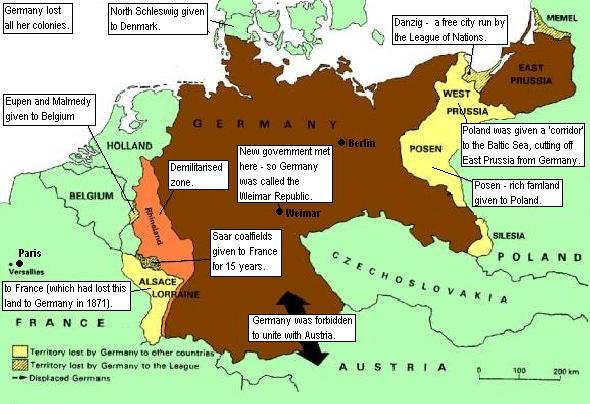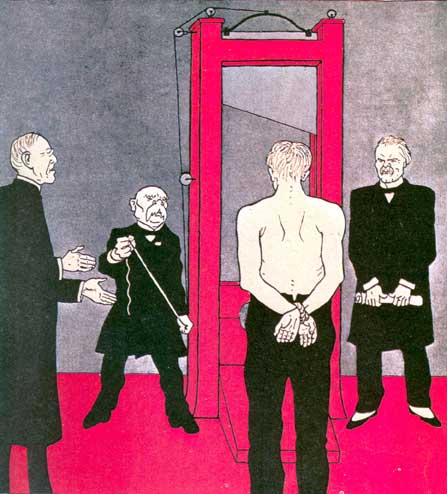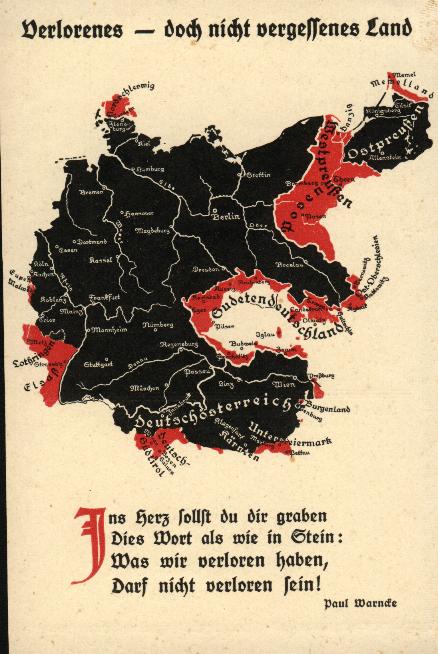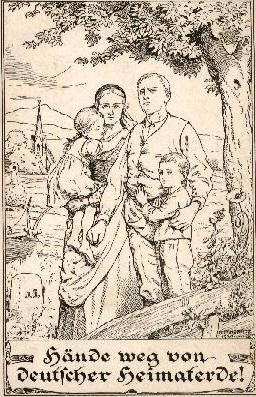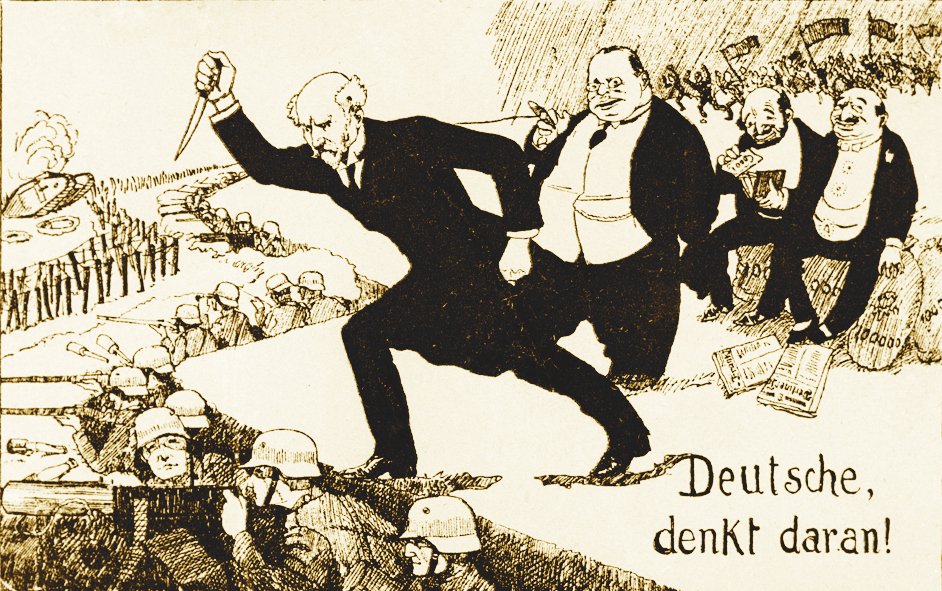|
|
NOTE: this topic is a stated topic on the AQA, Edexcel and iGCSE specifications. It is NOT a stated topic on the OCR specification, though it is essential pre-knowledge.
|
|
When they ended the war, many Germans were hopeful that the peace would be based on the 'Fourteen Points' proposed by American President Woodrow Wilson, rather than on the rather harsh tems of the Armistice. They were brutally disabused of such illusions during the Conference which drew up the Treaty of Versailles – they were excluded from the negotiations, and presented with the terms as a fait accompli: |
Going DeeperThe following links will help you widen your knowledge:
|
The Main Points of the Treaty [BRAT]The first 26 Articles of the Treaty set out the Covenant of the League of Nations (qv); the rest of the 440 Articles detailed Germany's punishment: 1. Germany had to accept the Blame for starting the war (Clause 231). This was vital because it provided the justification for... 2. Germany had to pay £6,600 million (called Reparations) for the damage done during the war. 3. Germany was forbidden to have submarines or an air force. She could have a navy of only six battleships, and an Army of just 100,000 men. In addition, Germany was not allowed to place any troops in the Rhineland, the strip of land, 50 miles wide, next to France. 4. Germany lost Territory (land) in Europe (see map, below). Germany’s colonies were given to Britain and France. You will see it claimed that Germany lost 13% of its land, 10% of its population, and 13.5% of its economy. (Also, Germany was forbidden to join the League of Nations, or unite with Austria.)
|
Source AWhich hand, putting us and itself in chains like these, would not wither? Frederick Scheidemann, the German Chancellor (June 1919)
Source BThis cartoon appeared in the German satirical magazine Simplissimus, 3 June 1919 Click here for the interpretation
|
1. The German Reaction at VersaillesOn 7 May, the victors presented their Treaty to the small German delegation. Count Brockdorff-Rantzau angered the Big Three by giving a long speech criticising the Treaty; then the delegation left and set about countering it. A little later, they sent their counter-proposal (based on the Fourteen Points) to the Big Three – their reply was so good that one of the British delegation said it was much better than the Allies' suggestions, and even Lloyd George wondered for a time if they ought to rethink the treaty. Then the delegation went home. Many Germans wanted to refuse to sign the treaty; some even suggested that they start the war again. So it was with great difficulty that the President got the Reichstag to agree to sign the treaty, and the imperious way the two German representatives were treated when they were forced to sign made things worse.
2. The Germans HATED the Treaty of Versailles [BRAT-U]1. The Germans hated Clause 231; they said they were not to Blame for the war. The soldier sent to sign the Treaty refused to sign it – ‘To say such a thing would be a lie,’ he said. Clause 231 did not physically harm Germany, but it hurt Germany's pride – and it was this, as much as anything else, that made them want to overturn the treaty. 2. The Germans hated Reparations; they said that the Treaty was trying to starve their children to death. At first they refused to pay, and only started paying after France and Britain invaded Germany (January 1921). 3. The Germans hated their tiny Army. They said it left them helpless against other countries. At first they refused to reduce the army, and the sailors scuttled (sank) the fleet rather than hand it over. The Dolchstosslegende grew up in Germany that the German Army had not been defeated, but had been ‘stabbed in the back’ by the politicians. 4. The Germans also hated the loss of Territory – they claimed that the treaty was simply an attempt to destroy their economy. Other nations were given self-determination – but the Treaty forced Germans to live in other countries. Germans were also angry that they could not unite ('Anschluss') with the Germans in Austria. 5. Most of all, the German delegates argued that the Treaty was morally Unfair – a 'diktat' (IMPOSED settlement). They had not been allowed to take part in the talks – they had just been told to sign. |
Primary Sources Brockdorff-Rantzau on the economic articles of the Treaty.
Source CThe disgraceful Treaty is being signed today. Don’t forget it! We will never stop until we win back what we deserve. From Deutsche Zeitung, a German newspaper, 28 June 1919.
Source DWe are told that we should acknowledge that we alone are guilty of having caused the war. I would be a liar if I agreed to this. We are not trying to avoid all responsibility for this world war. However, we emphatically deny that the German people should be seen as the only guilty party. Count Brockdorff-Rantzau, leader of the German delegation to Versailles (15 May 1919).
Source EThose who sign this treaty, will sign the death sentence of many millions of German men, women and children. Count Brockdorff-Rantzau (15 May 1919).
Did You Know?Fritz Haber (the German-Jewish scientist who had invented the use of chlorine gas as a weapon during the First World War) spent years after the war trying to find a way to extract the gold dissolved in seawater. He hoped it might be a cheap way for Germany to pay off reparations
|
Source F |
Source G |
Source H This 1924 postcard shows German politicians Philipp Scheidemann and Matthias Erzberger stabbing the German Army in the back. "Germans are reflecting on this" says the card. Notice the faces of the politicians' two supporters.
← Source F shows a German postcard, produced at the time
and entitled: 'Lost but not forgotten land', showing the lands where Germans lived.
The areas in red are the lands given to other countries by the
Treaty of Versailles (including land
lost by Austria). The poem under the map reads:
← Source G is another German postcard produced at the time. Its title is 'Hands off German Homeland'.
|
3. Was the Treaty Unfair to Germany? [BRAT-UP]Many historians have denied that the Treaty was unfair, most recently the American historian Sally Marks (2013). 1. Actually, the peacemakers had explicitly decided NOT to Blame Germany for the war, although some delegates wanted to do so. Instead they used the word ‘responsible’ (which gave them the legal right to charge Germany reparations). The German delegation, however, (intentionally) translated the word ‘responsible’ with the German word ‘Schuld’ – a word meaning ‘responsible’ in the sense of blame/ ‘moral guilt’ – so that they could be outraged about it. Historians have known about this since 1929. 2. As for Reparations, Marks says bluntly: “There are those, not all German, who claim reparations were unpayable. In financial terms, that is untrue”. Germany had not suffered any damage during the war, and its economy boomed in the 1920s. Taxes in Germany were lower than in most of Europe, but the government refused to increase them. The Treaties only required Germany to pay the first 50bn marks (£2.5bn) – the rest dependant on her ability to pay – over a period of 60 years, and the term was extended in 1924, and the amount reduced in 1929. By comparison, the War had cost Britain £6.2bn, including a debt to the USA of £1bn, which the Americans required paying back in full. It was not that Germany could not pay; Germany would not pay. 3. As for the Army, Marks comments: “The German army was ample to maintain internal order and defend against all neighbors except France … critics do not say why Germany needed a larger army, nor do they explain why states that had spent four years defeating one German effort to conquer the continent should enable another.”. 4. And as for Territory, Germany did NOT lose, as is often claimed, 13% of the land, 10% of its population, and 13.5% of its economy. Recently, the historian Robert Boyce (2009) has pointed out that most of the areas lost had been newly acquired and/or were non-German. Meanwhile, the peacemakers refused France’s attempt to make the demilitarised Rhineland a separate state, and left it as part of Germany. 5. Modern historians do not believe that the Treaty was Unfair to Germany, especially compared to the terms that Germany had imposed on Russia in 1918, and intended to impose on the Allies if Germany won the war. Correlli Barnett (1986) declared Versailles: “hardly a slap on the wrist”. 6. So why is it, asked Sally Marks, that not just popular opinion, but many professional historians, still condemn the Treaty as unfair on Germany? In Mistakes and Myths, she finds the answer: “one of the world’s most successful and longest-lasting Propaganda efforts.
|
Did You Know?Germany did not pay off the reparations bill until 2010. The historic final payment of £59m was not made until Sunday, 3rd October 2010, ninety-two years after the war ended.
Consider:Study Sources A-G and extract all the reasons you can find as to WHY Germans hated the Treaty of Versailles. Analyse them into two sets:
|
Source IThe peace settlement … came to be perceived by all political parties and by the public at large as unduly harsh and punitive in its treatment of Germany. Hitler's rearmament of the Fatherland, the remilitarization of the Rhineland, the Anschluss with Austria, and the occupation of the Sudetenland were all significant attacks on the Versailles system. Catherine Ann Cline, British Historians and the Treaty of Versailles (1988). |
Source JGermany deliberately misinterpreted the Fourteen Points that stood at the heart of the matter. Claims that the German empire lost 13 per cent of its territory and 10 per cent of its population are based on phony statistics. Article 231 of the treaty, the much maligned `war guilt paragraph`, did not assign war guilt to Germany. Above all, it was not the `burden` caused by reparation demands that stood behind the calamitous collapse of the Weimar economy which accompanied the massive defection of middle-class voters to the Nazi Party from the late 1920s onward.. Jurgen Tampke, A Perfidious Distortion of History (2017). |
Consider:Discuss the following question, suggesting points for and against: How justified were the German objections to the Treaty of Versailles? Are you able to make a judgement?
|
|
|
||
|
Spotted an error on this page? Broken link? Anything missing? Let me know. |
| |
